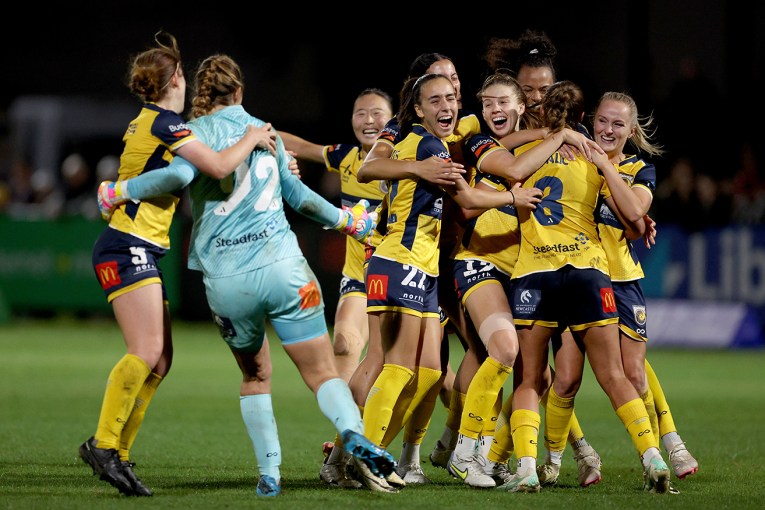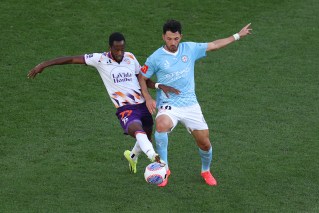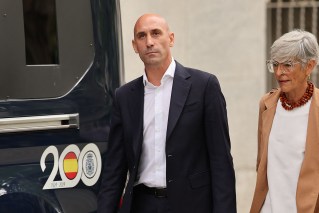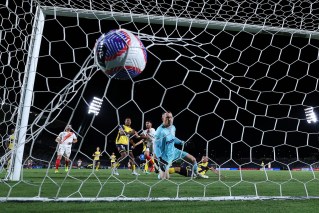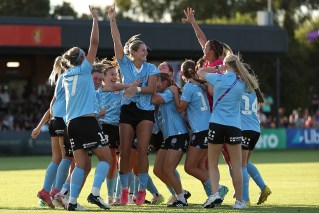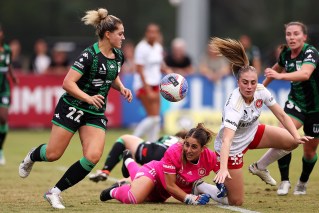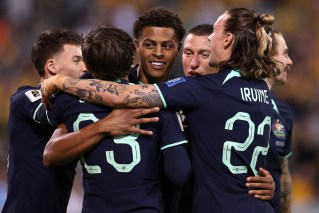What is next in the FIFA corruption saga?
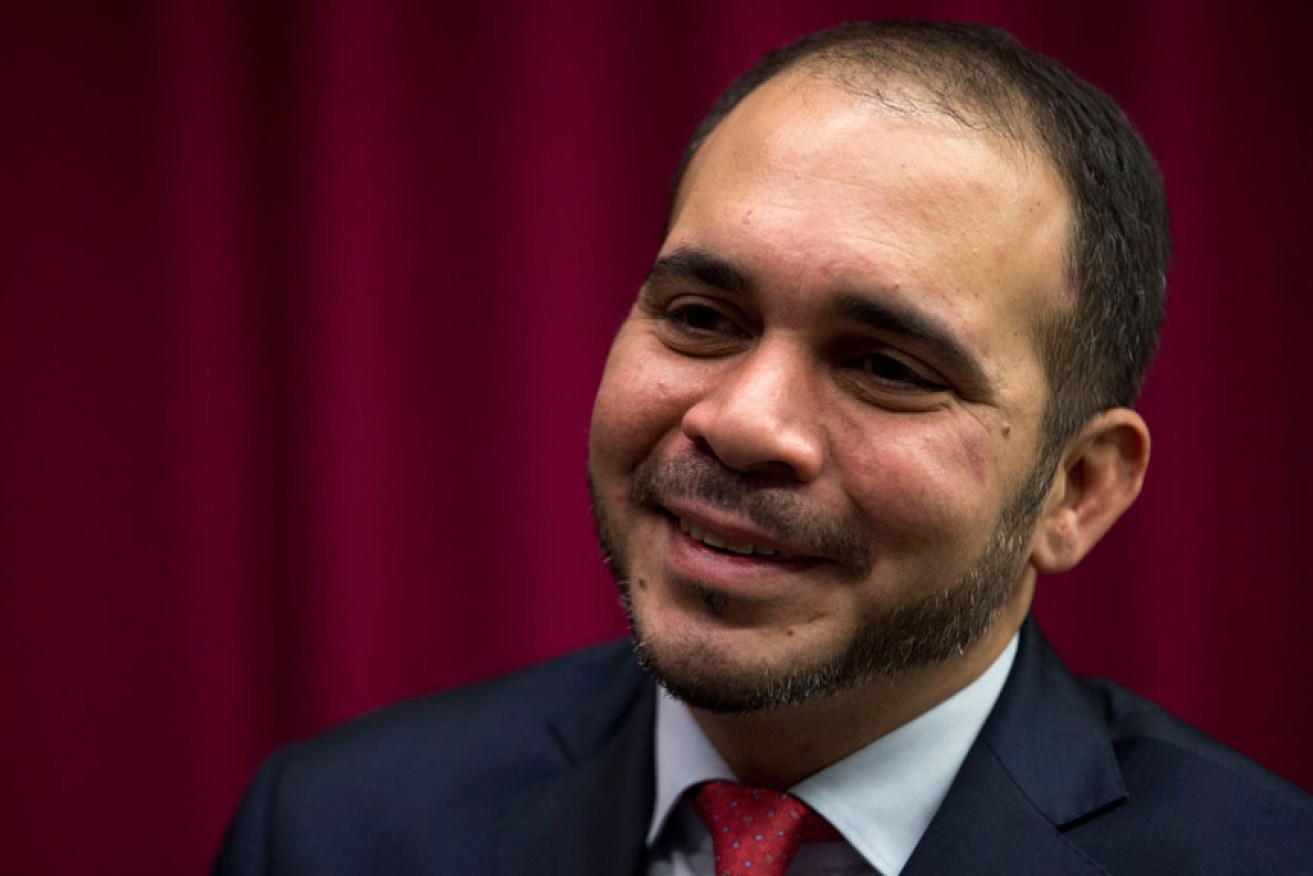
AAP
FIFA president Sepp Blatter faces his biggest challenge to maintain his control of football’s world governing body after nine of the organisation’s officials were arrested on corruption charges.
Blatter has been the head of FIFA since 1998, when he succeeded Brazilian supremo Joao Havelange.
There have been many controversies during his time at the top, but nothing as big as the US indictment of nine football officials and five sports media and promotions executives for corruption charges involving more than $US150 million ($193.47 million).
• ‘Blatter has to go’: English Football Association
• Top FIFA officials arrested in Zurich
• FFA reviewing FIFA corruption
• Rotten to the core: why did we deal with FIFA?
The arrests – on federal charges, which if proven could carry jail terms – have provoked calls for immediate action from FIFA, from Blatter’s resignation and a re-run of the bid votes for the 2018 and 2022 World Cups, to a shutting down of the whole organisation and reinventing the whole structure of global football management.
So what are the next steps in this saga? How will this play out?
In the immediate future, the first item on the agenda is the vote for president at FIFA’s 65th annual congress in Zurich, Switzerland, scheduled for Friday morning (AEST).
Blatter still favourite for fifth term despite FIFA turmoil
The 79-year-old Blatter is up against sole challenger Prince Ali bin-al-Hussein of Jordan, as he seeks to win a fifth four-year term in charge of FIFA.
Two other candidates, Michael van Praag of the Netherlands and former Portugal soccer legend Luis Figo, withdrew their candidacies last week.
Last time round, Blatter received 186 out of 203 possible votes in a landslide win.

Prince Ali bin-al-Hussein of Jordan is challenging Sepp Blatter for the top job. Photo: AAP
Despite a run of bad news for FIFA in recent months, including the resignation of independent ethics investigator Michael J Garcia after FIFA’s refusal to publish his full report into allegations of corruption in world football, Blatter remains the overwhelming favourite to win the vote.
There are three options. Either the vote is held and Blatter wins, the vote is held and Blatter loses, or – as Europe’s football governing body UEFA has called for – the vote is postponed for up to six months to allow time for the investigation to settle.
Pulitzer Prize-winning New York Times reporter Matt Appuzzo, who was part of the team who broke the story of the arrests, told ABC Radio National that he had no inside knowledge about the vote.
“I’m not a FIFA guru … like many Americans I pay scant attention to FIFA until the World Cup,” he said.
“But I am a federal law enforcement reporter – [I think] whether he wins or loses, Sepp Blatter is going to be looking around and asking himself ‘all these people who just got charged, they’re not going to say anything about me, are they?'”
Blatter was not among those arrested or charged, and there is no immediate prospect of that changing.
“The folks I’m talking to say obviously they don’t have a case against Sepp Blatter here today,” Appuzzo said.
“They’re not going so far as to say they’re trying to build one [a case].
“But they say ‘let’s see where the investigation goes from here’. His fate will be determined by what is uncovered going forward.”
Corporate pressure a key to change at the top

The FIFA World Cup attracts some of the biggest sponsorship dollars in world sport. Photo: Getty
ABC commentator and The New Daily columnist Francis Leach told ABC News Breakfast that FIFA’s future direction did not necessarily depend on the outcome of the vote.
“It’s fascinating to watch because the likes of Coca-Cola, Visa and FIFA’s other big corporate partners – who have been the beneficiaries of the FIFA World Cup and the power that it has to lift the profile of major corporations – haven’t spoken out about it as yet,” he said.
“We wait and see whether the campaign that’s been running for a while for … FIFA’s big corporations to disassociate themselves from FIFA, actually gains momentum.
“[If and] when they start to walk away, when they start to say we can no longer afford to be tarnished by our association with FIFA, that’s when I think we’ll see the real movement at the top.
“It will always follow the money – when the money starts to walk, that’s maybe when Sepp Blatter’s empire starts to crumble.”
Australian whistleblower Bonita Mersiades, a former Football Federation Australia corporate affairs manager, told ABC’s Lateline on Wednesday night the way ahead for world football required reform, whether Blatter remained in charge or not.
“I would hope that we could convince governments, sponsors – fans are certainly wanting this – to look at having an independent FIFA reform commission,” she said.
“[It should be] led by an eminent person to review, develop and implement a complete new system of statutes, policies, operational policies so we can go forward with a new FIFA, a new type of FIFA and have confidence and trust in the decisions that organisation makes.”
2018, 2022 Cups likely to go ahead as planned

FIFA has received vocal criticism for the selection of Qatar as the host for the 2022 World Cup. Photo: Getty
The other side of the equation is a Swiss criminal investigation into allegations of corruption in the bidding processes for the 2018 and 2022 World Cups, awarded to Russia and Qatar respectively.
Swiss police arrested seven top football officials – who are among the 14 named in the US investigation.
Australia spent $46 million on its bid for the 2022 Cup, but received just one vote and was eliminated after the first round of voting.
A FIFA spokesman has already confirmed the organisation’s intent that both tournaments will proceed with their current hosts, despite the Swiss investigation.
Leach told News Breakfast he would like to see a change to Qatar’s hosting of the 2022 Cup, because of allegations of human rights abuses regarding workers building the World Cup sites, and the fact that Qatar had “turned the universe on its head” by having the time of the tournament changed from a traditional northern hemisphere summer slot to winter time to avoid the country’s extreme heat.
“I can’t see 2018 in Russia changing (however), it’s just too late in the process,” he said.
“It is (World Cup bidding) at the heart of this, the ability to hold onto the bidding rights for such an event and exploit it for personal gain.”
Leach said the bidding process for 2018 and 2022 was disastrous, largely because – in an unusual move – the two Cups were decided concurrently.
“They were horse-trading between 2018 and 2022 (bids), it provided huge leverage to those who would exploit the situation to absolutely do so,” he said.
“The big question is what is the process for the future? How do we go about running fair and clean bidding process for World Cups so this can’t happen again?”
